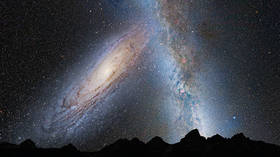Running out of time? Earth could meet its end if Milky Way is ‘eaten’ by another galaxy… in 4.5 billion years
The Earth could be toast after the Milky Way goes head-to-head with a ‘cannibalistic’ galaxy in just a few billion years, according to a new study. Time to start stockpiling canned food in your basement?
Our home galaxy is projected to collide with the star-gobbling Andromeda galaxy in approximately 4.5 billion years, scientists from the Research School of Astronomy and Astrophysics at the Australian National University have concluded. The neighboring star system has swallowed up smaller galaxies in the past, and now the Milky Way is next on the menu.
Dr. Dougal Mackey, who participated in the study, said that the showdown could hurl the Sun into intergalactic space, or somehow perturb our planet’s orbit “such that the Earth can no longer support life.” However, he predicted that such a scenario is unlikely, and that instead the collision will simply form a single but much larger galaxy.
Also on rt.com One for the X-Files? Mysterious ‘fireball’ that crashed in Chile is NOT meteor, scientists say (PHOTOS)Carlos Frenk, the study’s co-author, suggested that the merger will create a “spectacular display of cosmic fireworks” for our human descendants – assuming there are any alive to witness the galactic crash.
The collision will be tragic even if humans manage to survive the cataclysm, another of the study’s lead authors, Professor Geraint Lewis from the University of Sydney, argued.
“In the end, [both galaxies are] going to lose because they're both beautiful spiral galaxies,” he said.
The bad news is that even if humankind lives to see the collision happen, the Sun will still explode 1-2 billion years later, guaranteeing the end of all life on Earth.
Also on rt.com ‘Insurance policy for planet Earth’: Space agencies to smash spacecraft into asteroid at over 14,000 mphLike this story? Share it with a friend!















